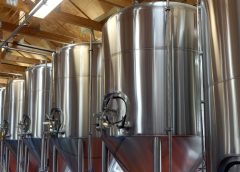Regardless of whether you’re brewing out of your own garage or a big warehouse, sanitation needs to be your top priority. Breweries can only thrive in clean environments. Unclean equipment and facilities can lead to some seriously fouled product—not to mention profit loss. Use these tips for keeping your brewery clean and sanitary, so you don’t run into issues later on.
Keep Concrete Floors Sealed
A common issue that gets overlooked in smaller brewing operations is the flooring of the brewing space. Concrete floors are common, but they are also porous and prone to cracking. This allows moisture and even spilled beer to collect in the floor. Over time, this moisture and beer can start to attract some harmful contaminants that you don’t want anywhere near your beer. Sealing a concrete floor is the best way to make it easier to clean and prevent germs from festering.
Efficient Employee Sanitation Training
If your brewery is large enough to have employees, an important tip for keeping your facility sanitary is to take their sanitation training seriously. You never want to imply that cleaning and sanitation are simply afterthoughts; rather, they are critical parts of the brewing process, and just as important as something like mashing or fermentation. In the same vein, you need to have reprimand protocols in place for employees that overlook their cleaning regimen.
Never Skip a Sanitation Cycle
All the equipment that you use for brewing should have very clear instructions about how to clean them. You can’t afford to skip a single sanitation cycle whenever you use a piece of equipment. Even your kegs need to either be hand-washed or go through a full cycle in a keg washing machine once they are drained. You should never assume that something is “clean enough,” as many contaminants can’t be seen by the naked eye but could still contaminate your next batch of beer.
Clearly Label All Cleaning Products
Breweries go through a lot of cleaning products, and they don’t all mix together in a safe way. Thoroughly sanitizing stainless steel requires both a caustic and a sanitation component. However, caustic solutions and sanitizing solutions should never mix, and you don’t want to accidentally mix them up. Not only will clearly labeling your cleaning products prevent any unsafe mixing, but it also helps to ensure that a full sanitation cycle took place before more ingredients touch anything.
By taking these tips seriously, you can feel safer about your brewery’s sanitation levels and rest easy knowing that your product is safe to consume.




